What is a CBCT in dentistry?
Dental cone beam computed tomography (CT) is a special type of x-ray equipment used when regular dental or facial x-rays are not sufficient. Your doctor may use this technology to produce three-dimensional (3-D) images of your teeth, soft tissues, nerve pathways, and bone in a single scan.
CBCT images have been shown to be successful for various clinical uses, including oral and maxillofacial surgery, orthodontic and endodontic therapies (Small FOVs), and implant planning and placement.
CBCT technology may be used by general dentists and specialists to improve diagnosis and treatment planning in the following cases:
- Location of anatomic structures: mandibular canal, submandibular fossa, incisive canal, maxillary sinus.
- Size and shape of ridge, quantity, and quality of bone.
- Number and 3D orientation of implants.
- Length and diameter of planned implants.
- Need for bone graft, sinus lift.
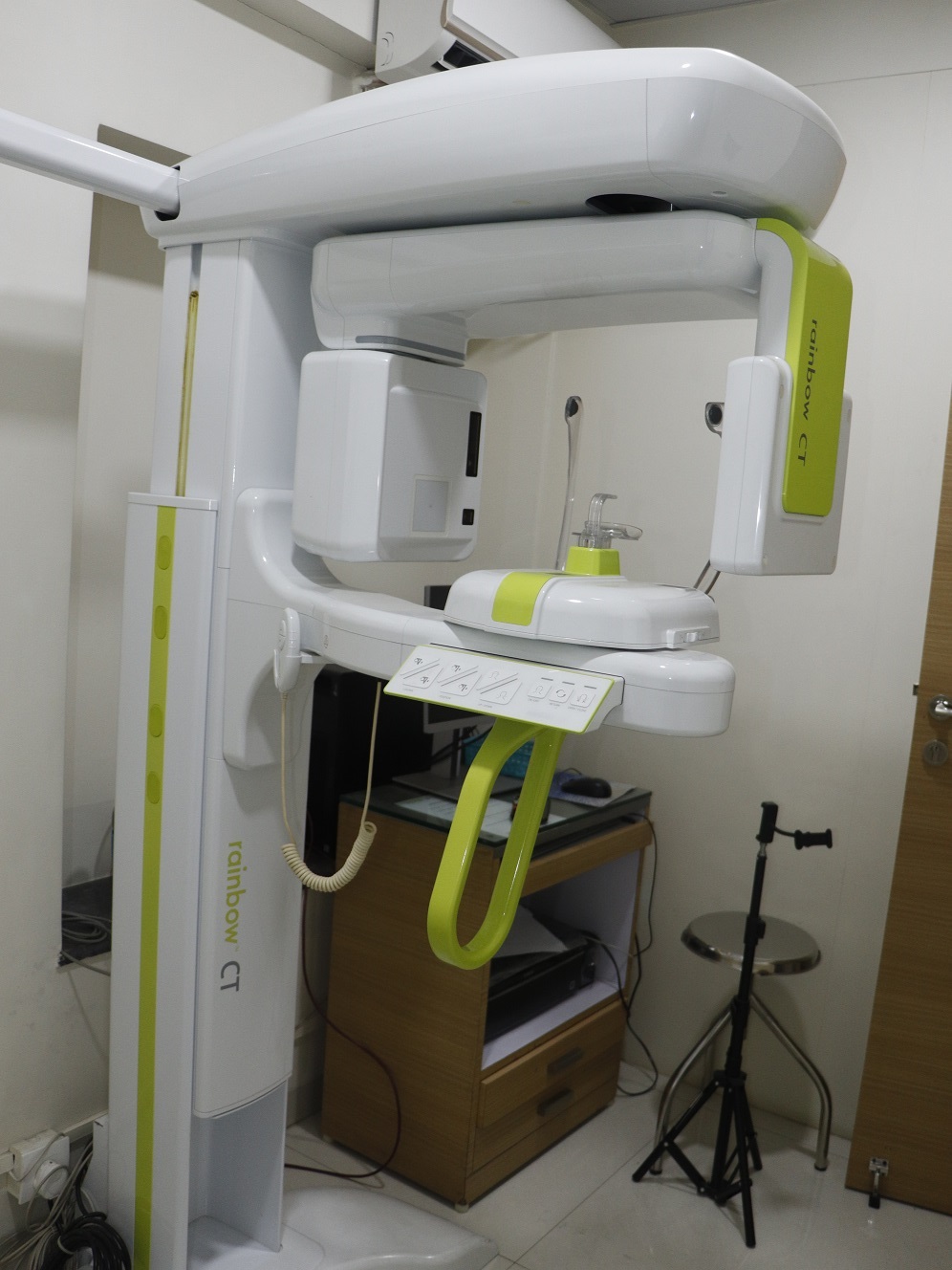

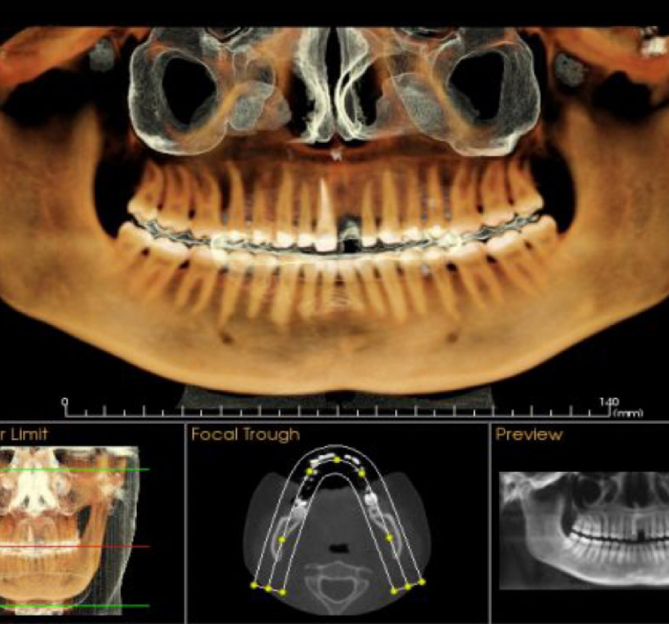
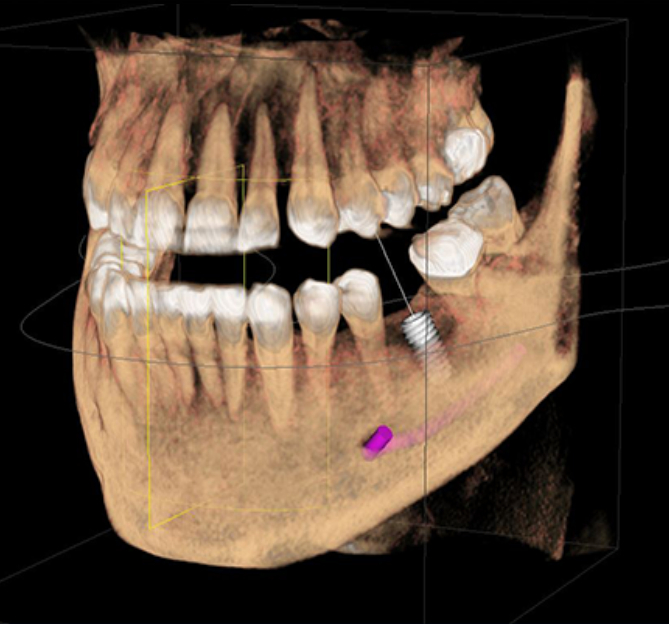
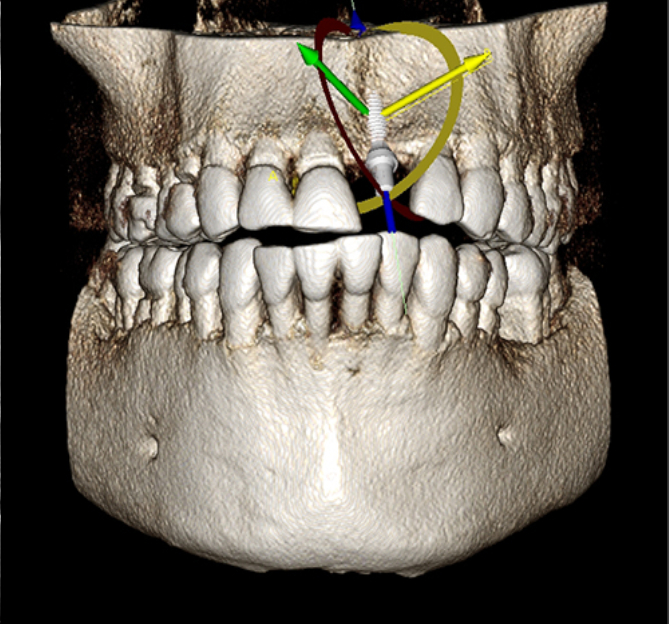

How does the procedure work?
During a cone beam CT examination, the C-arm or gantry rotates around the head in a complete 360-degree rotation while capturing multiple images from different angles that are reconstructed to create a single 3-D image.
The x-ray source and detector are mounted on opposite sides of the revolving C-arm or gantry and rotate in unison. In a single rotation, the detector can generate anywhere between 150 to 200 high resolution two-dimensional (2-D) images, which are then digitally combined to form a 3-D image that can provide your dentist or oral surgeon with valuable information about your oral and craniofacial health.
Computed Tomography
There is increasing use of CT (computed tomography) scans in dentistry, particularly to plan dental implants; there may be significant levels of radiation and potential risk. Specially designed CBCT (cone beam CT) scanners can be used instead, which produce adequate imaging with a stated tenfold reduction in radiation. Although computed tomography offers high-quality images and accuracy, the radiation dose of the scans is higher than the other conventional radiography views, and its use should be justified Controversy surrounds the degree of radiation reduction though as the highest quality cone beam scans use radiation doses not dissimilar to modern conventional CT scans.
Cone-beam computed tomography
Cone-beam computed tomography (CBCT), also known as digital volume tomography (DVT), is a special type of X-ray technology that generates 3D images. In recent years, CBCT has been developed specifically for its use in the dental and maxillofacial areas to overcome the limitations of 2D imaging such as buccolingual superimposition. It is becoming the imaging modality of choice in certain clinical scenarios although clinical research justifies its limited use.
Developing dentition
- Assessment of unerupted and/or impacted teeth
- Assessment of external resorption
- Assessment of cleft palate
- Treatment planning for complex maxillofacial skeletal abnormalities
- Restoration of dentition (if conventional imaging is inadequate).
- Assessment of infra-bony defects and furcation lesions
- Assessment of root canal anatomy in multi-rooted teeth.
- Treatment planning of surgical endodontic procedures and complex endodontic treatments.
- Assessment of dental trauma.

Indications of CBCT, according to the SEDENTEXCT (Safety and Efficacy of a New and Emerging Dental X-ray Modality) guidelines include.
Surgical
- Assessment of lower third molars where an intimate relationship with the inferior dental canal is suspected.
- Assessment of unerupted teeth.
- Prior to implant placement.
- Assessment of pathological lesions of the jaws (cysts, tumors, giant cell lesions, etc.).
- Assessment of facial fractures.
- Treatment planning of orthognathic surgery.
- Assessment of bony elements of the maxillary sinus and TMJ.
Dental CBCT Scan In Nigdi
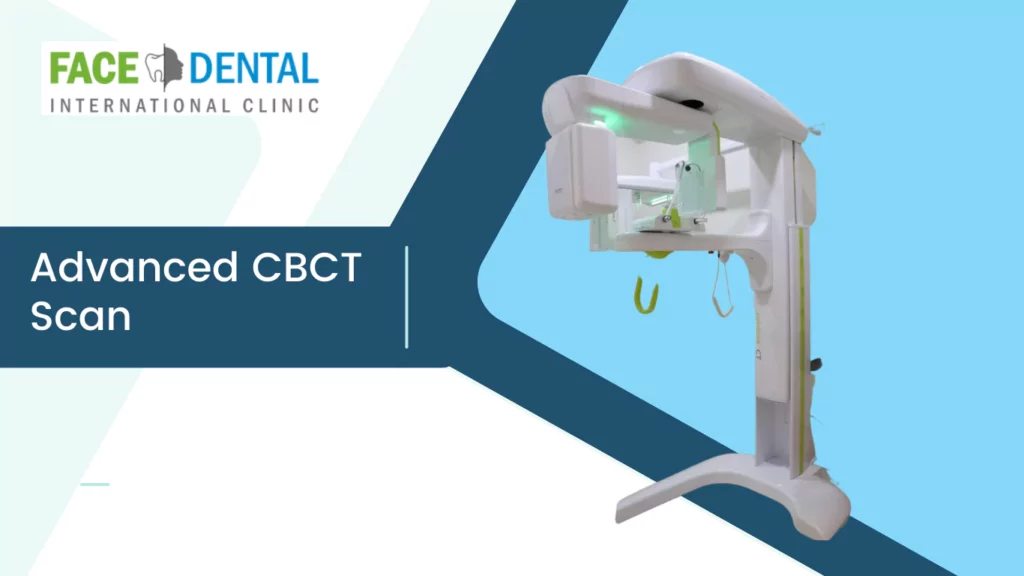
Dental Cone Beam Computed Tomography (CT) or C-B-C-T scan is a specialized x-ray machine used when regular dental or facial x-rays can’t provide enough information. While it’s not used routinely due to higher radiation exposure, it generates three-dimensional (3-D) images of dental structures, soft tissues, nerves, and craniofacial bone in a single scan. This technology aids in more precise treatment planning. Cone Beam CT isn’t the same as conventional CT, but it produces similar types of images. During the scan, an x-ray beam in the shape of a cone circles the patient, creating numerous images or views. Both CT scans and cone beam CT offer high-quality images. Dental cone beam CT was developed for outpatient use, offering similar imaging capabilities as conventional CT but with a smaller and more cost-effective machine, suitable for dental offices. It provides detailed bone images and is commonly used to evaluate jaw and dental issues, the facial bone structure, sinuses, and more, with lower radiation exposure than conventional CT.

Common Uses of the CBCT Scan Procedure
CBCT Scan Procedure Process
Benefits of Dental Cone Beam CT (CBCT scan)

- Focused x-ray beam reduces scatter radiation, enhancing image quality.
- A single scan provides various views and angles for more comprehensive evaluations.
- Cone beam CT offers more information than regular dental x-rays, aiding precise treatment planning.
- CT scans are painless, noninvasive, and highly accurate.
- CT scans simultaneously image bone and soft tissue.
- No radiation remains in the body after the exam.
- X-rays used in CT scans have no immediate side effects.

Embark on your journey towards a radiant, confident smile with the best advanced CBCT scan.
Contact us to schedule a consultation and explore how our dentist services can transform your smile and enhance your life.
Why CBCT
When it comes to precise dental imaging, the CBCT scan, or Cone Beam Computed Tomography, is the star of the show. If you're wondering, "Where can I find a CBCT scan near me for my dental needs?" look no further.
CBCT scans are essential for comprehensive dental diagnoses, offering 3D images of your teeth, jaws, and surrounding structures. With advanced technology, CBCT scans are not only accurate but also minimize radiation exposure. So, you can have peace of mind knowing that your dental health is in safe hands.
For top-quality CBCT scans in your area, consider visiting a dental clinic that offers CBCT scan dental services. With this cutting-edge technology, your dentist can provide precise treatment planning, ensuring your dental care is tailored to your specific needs.
About Us

Face N Dental International Clinic uses modern dental innovation and has transformed the way we approach dental solutions. If you’re considering “CBCT scan dental near me” in Nigdi Pradhikaran, Pimpri Chinchwad, look no further. We serve as a comprehensive dental hub catering to residents in the vicinity, including Ravet, Nigdi, Pradhikaran, Akurdi, and Pimpri Chinchwad, Pune, offering a range of dental solutions under one roof.

Book Your Appointment Now
&
Get Ready To Show Off Your Shining Smile!
Frequently Asked Questions
CBCT, or Cone Beam Computed Tomography, is a specialized type of dental imaging technology used for comprehensive examinations of the oral and maxillofacial regions. It provides 3D images of teeth, jaws, nerve pathways, and bone structures. Dentists use CBCT for precise diagnosis and treatment planning in various dental procedures, such as implant placement, orthodontic treatment, and evaluating complex dental issues.
CBCT and CT (Computed Tomography) serve different purposes. CBCT is tailored for dental applications, delivering high-quality 3D images with lower radiation exposure compared to conventional CT scans. Its focused beam reduces scatter radiation, resulting in better dental image quality. While CT is used for broader medical purposes, CBCT is preferred in the dental field for its efficiency and safety.
Yes, dental CBCT is considered safe when used by trained professionals and for appropriate diagnostic purposes. The radiation exposure in CBCT is significantly lower than that of medical CT scans, making it a preferred choice for dental imaging. Dentists follow strict guidelines to ensure patient safety and minimize radiation exposure during CBCT scans.
CBCT scans are necessary in specific dental cases where conventional X-rays cannot provide sufficient information. They are typically recommended when a more detailed 3D view of the oral and maxillofacial structures is required for accurate diagnosis and treatment planning. Your dentist will recommend a CBCT scan when it is essential for your dental care.
The choice between MRI (Magnetic Resonance Imaging) and CBCT depends on the clinical need. MRI is best suited for soft tissue imaging, while CBCT is specifically designed for dental and maxillofacial imaging. For dental purposes, CBCT is generally more appropriate because it provides detailed images of the teeth, bones, and related structures with lower radiation exposure. The choice between the two depends on the diagnostic requirements of your specific condition.
Tags – cone beam ct scan, cbct scan near me, cbct scan dental, cbct scan dental near me, cbct scan dental centre in Ravet PCMC Pune, cbct scan in Nigdi Pimpri Chinchwad, cbct scan in Akurdi PCMC Pune
